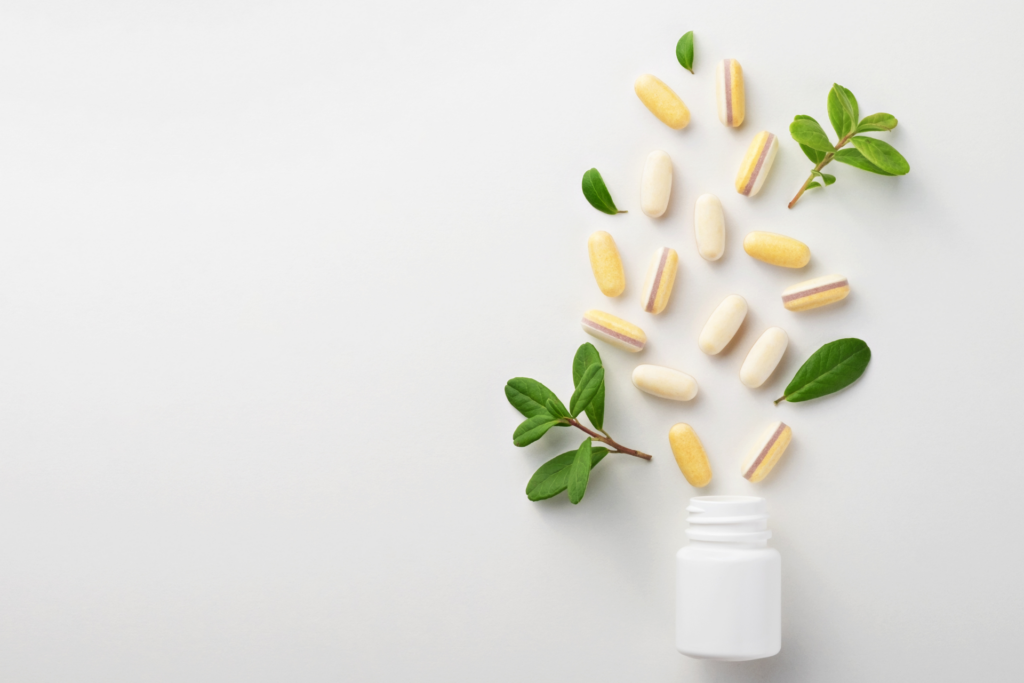
At Restore Psychiatry & Wellness, we understand that mental health is multifaceted. Our holistic psychiatry approach recognizes that while traditional treatments like therapy and medication are essential components of a comprehensive treatment plan, incorporating certain herbal supplements can further support your journey toward improved mental well-being. This blog discusses how specific vitamins and supplements can impact depression, anxiety, and sleep promotion, helping you work in partnership with your personalized treatment plan.
1. Vitamin D
Purpose: Supports immune function, bone health, and mood regulation.
Recommended Daily Dose: 1000-2000 IU for adults.
Benefits: Adequate levels of Vitamin D have been linked to improved mood and may help alleviate symptoms of depression. Many individuals with depressive symptoms may also have low Vitamin D levels, making supplementation an essential consideration.
2. Omega-3 Fatty Acids (with DHA + EPA blend)
Purpose: Supports brain function, heart health, and reduces inflammation.
Recommended Daily Dose: 1000 to 2000 mg of combined DHA and EPA.
Benefits: Omega-3 fatty acids may help reduce symptoms of anxiety and depression and promote better sleep. Research suggests that doses ranging from 1000 mg to 4000 mg of combined EPA and DHA can be beneficial for treating depressive symptoms.
3. Magnesium Glycinate
Purpose: Supports muscle and nerve function, promotes relaxation before sleep, and aids in energy production.
Recommended Daily Dose: 200-400 mg for adults.
Benefits: Magnesium may help reduce symptoms of anxiety and improve sleep quality by promoting relaxation and reducing muscle tension. It’s particularly beneficial for those who experience stress-related sleep disturbances.
4. Probiotics
Purpose: Supports gut health and digestive function.
Recommended Daily Dose: Varies depending on the strain and formulation; naturally found in fermented foods.
Benefits: A healthy gut microbiome is linked to improved mood and mental well-being. Serotonin, a neurotransmitter involved in mood regulation, is primarily produced in the gut, highlighting the importance of gut health for mental wellness.
5. Ashwagandha
Purpose: Adaptogenic herb that helps reduce stress and promote relaxation.
Recommended Daily Dose: 300-600 mg of standardized extract.
Benefits: Ashwagandha may help alleviate symptoms of anxiety and improve sleep quality by reducing stress levels, making it a valuable addition to your mental health toolkit.
6. B12 (Vitamin B12)
Purpose: Supports nerve function, red blood cell production, and energy metabolism.
Recommended Daily Dose: 200-400 mcg for adults.
Benefits: Adequate levels of Vitamin B12 are crucial for mood regulation and may help improve energy levels, potentially alleviating symptoms of depression.
7. Methylfolate 5-MTHF (Vitamin B9)
Purpose: Supports DNA synthesis, red blood cell formation, and brain function.
Recommended Daily Dose: 400-800 mcg for adults.
Benefits: Folate works in tandem with Vitamin B12 to support mood regulation and may help reduce symptoms of depression, particularly in individuals with folate deficiencies.
8. Valerian Root
Purpose: Herbal remedy for promoting relaxation and improving sleep quality.
Recommended Daily Dose: 300-600 mg of standardized extract.
Benefits: Valerian root may help alleviate symptoms of anxiety and promote better sleep by increasing levels of GABA, a neurotransmitter that induces relaxation.
Other Recommendations
- L-Theanine: An amino acid found in green tea that promotes relaxation and reduces anxiety.
- Sam-e: Known to help reduce symptoms of depression.
- 5-HTP (5-Hydroxytryptophan): A precursor to serotonin that may help alleviate symptoms of depression and improve sleep quality.
- Magnesium L-Threonate: A form of magnesium that crosses the blood-brain barrier more effectively, offering additional benefits for cognitive function and mood regulation.
Important Considerations
While these supplements can support mental health, it’s crucial to remember that they should be considered complementary approaches and not substitutes for conventional medical treatment. As a psychiatric provider in Southern California, we emphasize the importance of consulting with your healthcare provider before starting any new supplement regimen, especially if you have existing health conditions or are taking medications. Individual responses to supplements may vary, and it’s vital to ensure that they align with your personalized treatment plan.
Incorporating essential supplements into your holistic mental health strategy can enhance your overall well-being. If you have questions about vitamins that help with anxiety and depression and sleep, herbal supplements, or how these supplements might fit into your personalized psychiatry treatment plan, don’t hesitate to reach out to us at Restore Psychiatry & Wellness or book an appointment. We’re here to support you on your journey toward improved mental health.
Disclaimer: The information provided in this blog is for educational purposes only and is not intended as a substitute for professional medical advice, diagnosis, or treatment. Always seek the advice of your physician or other qualified health provider with any questions you may have regarding a medical condition.